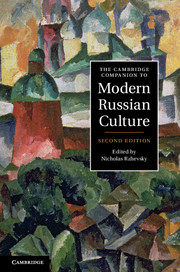10 - Music
from PART II - LITERATURE AND THE ARTS
Published online by Cambridge University Press: 28 July 2012
Summary
The Russian musical tradition has grown from three basic sources over the last one thousand years: the liturgy of the Russian Orthodox Church, folk culture, and the Western classical tradition. Running side by side, the first two streams have provided a rich flow of melodic and emotional inspiration to many generations of composers, eventually intertwining in the Western-informed music of nineteenth-century Russian masters such as Mikhail Ivanovich Glinka, Modest Petrovich Mussorgsky, Nikolai Andreevich Rimsky-Korsakov, Aleksandr Porfir'evich Borodin and Piotr Ilyich Tchaikovsky. In the twentieth century, liturgical and folk sources, now the inspiration for a leading edge of Western musical culture, continued to be essential ingredients of such composers as Sergei Vasil'evich Rachmaninov, Igor Fedorovich Stravinsky, Sergei Sergeevich Prokofiev and Dmitry Dmitrievich Shostakovich.
Particularly in works like Mussorgsky's historical operas Boris Godunov and Khovanshchina; Rimsky-Korsakov's The Legend of the Invisible City of Kitezh and the Maiden Fevronia; and Prokofiev's score to Sergei Eisenstein's film Ivan the Terrible, the materials of Russian folk and liturgical music were combined and transformed through the techniques of Western harmony and counterpoint into what has become immediately recognizable as the Russian classical tradition.
But post-1917 Russian music (like all areas of Russian culture) was also profoundly affected by the cultural policies of the Soviet communist regime. Of particular importance for the musical tradition was the official persecution of the Russian Orthodox Church.
- Type
- Chapter
- Information
- The Cambridge Companion to Modern Russian Culture , pp. 250 - 278Publisher: Cambridge University PressPrint publication year: 2012

